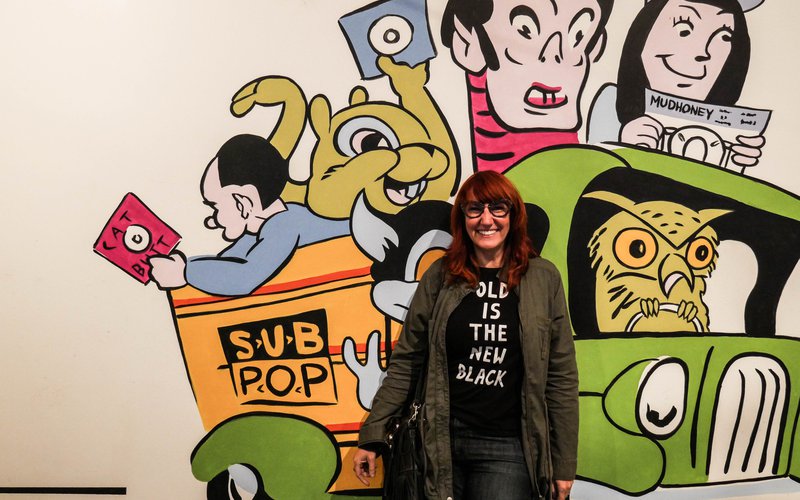
"I love swearing!" Sub Pop CEO Megan Jasper tells KEXP. "I love it so fucking much I can't even goddamn, motherfucking handle any other goddamn shit that comes my way."
Jasper's vernacular is appropo of just how fucking cool she is and the punk rock spirit with which she currently leads Sub Pop, one of the world's most renown independent labels. Sub Pop's legacy is in many ways inseparable from Jasper's entire ethos. She started at the label as an intern stuffing Cat Butt records and worked her way up to running the whole goddamn label. Famously, she once duped a little rag called the New York Times with an interview on fake grunge slang, including phrases like "swingin' on the flippity-flop" and "wack slacks." Her amazing sense of humor has become iconic in her tenure at Sub Pop, but when you dig into it, it's really her heart and passion for the artists that's helped turn the label into the cultural juggernaut that its become today.
Tomorrow, Sub Pop will celebrate it's 30th anniversary with a giant party at Alki Beach. But before you put on your fuzz and plats and head down to catch the shoes, take some time to get to know one of the key figures in the story. In our conversation, Jasper covers everything from her early days as a punk rock kid with a radio show and a probation officer to pulling pranks at the Sub Pop offices. Sub Pop is known for calling themselves and their artists "Losers," which is ironic because Jasper seems like she's come out winning in the end – swears and all.
What do people say about you Megan Jasper that makes you most proud?
You know, that's a hard question. So if I deal with somebody and I hear back through somebody else that they felt happy or comfortable or that they had a good experience just hanging or being themselves or whatever. That makes me feel proud. Yeah that might be it. You know, I guess like maybe the deeper thing beyond that is, what's the impact that you want to have in the world. And as cheesy and fucking goofy as it sounds, if I am able to allow for someone to have the space to be happy or feel comfortable or to feel like themselves in that moment. I am perfectly fine, with that being my purpose.
Is that your leadership style, if indeed you even have a leadership style? Or if that is something that matters to you rethink that way.
Well, you know, I think, I'm not even sure what my leadership style is. Because I think so much of it is about being able to listen and being able to hear people and then how do you put them in a position where they can put their best foot forward, because it's not the same for every single person. So I think maybe my style varies from person to person and then in a group setting, we all just have to be comfortable with the fact that we're all just weirdos trying to make it work. So I just hope that I'm clear or articulate or... or that I am making sense.
Did you have to learn how to listen? That's a hard thing to do. Most conversations are about saying what you want to say before hearing what the other person says. It drives me crazy. If you read the “seven most something habits of highly successful people kind of cheesy book,” it talks about listening.
Yeah, I think that I learned how to listen when I was a kid because I grew up in a home that, although we all loved each other, I mean, we were all fucking nut jobs. And in my home I had to know kind of what was happening when I walked in, and so I had to learn how to sense things and that means trusting your gut, thin sliced thinking and listening. So I think it came from that.
KEXP: So what do you mean you had to listen before you came into your house? Excuse me if this is personal and you don't wanna talk about it, but what was happening there?
Well there were times when I feel like we had harmony as a family and then there were times when we would fight a lot as a family. It was good to know if the fighting was happening, what you were walking into before you walked too far in. So it was that, it was just understanding a setting or a place so that you could be equipped to just know your place in it or to just back the fuck off and go hang out someplace else.
Does that inform how you are a CEO of Sub Pop records?
Well without the fighting part. Wedon't totally fight a whole lot at work.
I meant more like sensing what's happening in the place when you're either entering or... you get what I'm saying.
I would say I use that all the time, not just with my job but in any situation.
That's a crazy superpower!
I believe that nothing is all good or all bad and I think that you can take any situation and find the gifts within it. And I would say that was the gift that my childhood gave me.
Yeah that's fascinating. I'm 50. I don't think ever – well I could work on it but I'm not always so great at that. I'm more of like a snowball going down the hill just taking things with me.
That's very efficient.
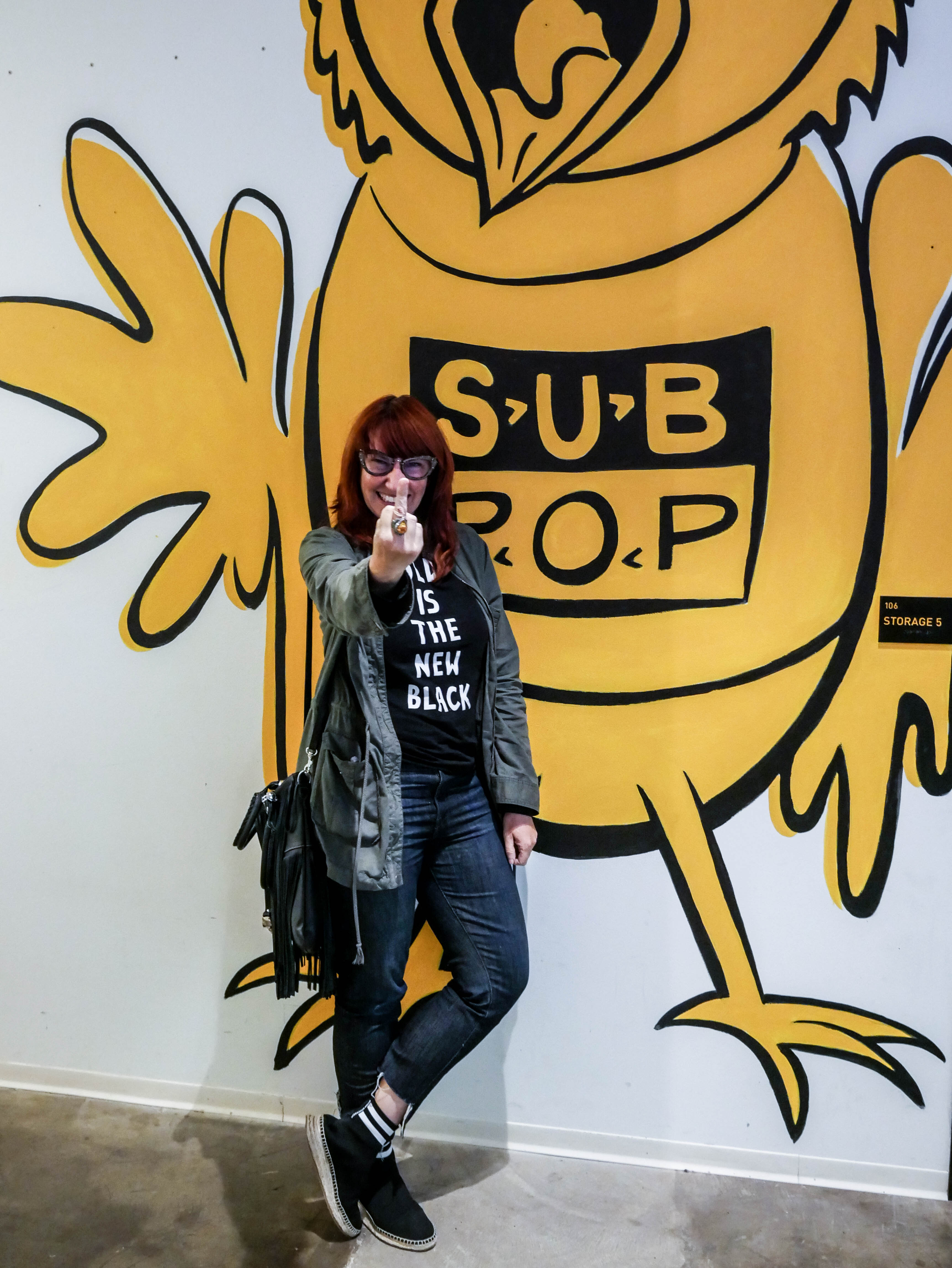
So this is a question that Morgan asked and I love it. So DJ Morgan Chosnyk asks, “As a woman, what does a CEO do?” What she meant by that, is literally the nuts and bolts of it but also what does she need to learn to be the next Megan Jasper next? Morgan Jasper, as it were.
I'd be so psyched if she was Morgan Jasper. She could be my lady spouse. So wait a minute, what's the question again? What do you have to do?
Yeah like what are what are the building blocks to become a CEO, essentially.
Well you have to be willing to work someplace for 30 years and to start as an intern.
Let me rephrase, I should say I think this is important here actually, a female CEO actually.
So, for real, what I would say is, I think that there are no limitations or restrictions on anybody. So maybe the most important thing is to know that and to believe that. And in those times when it's hard to believe anything – because we all have moments that are hard or wear down or we don't have the confidence that we wish we had. I think I'm not saying you fake it but I'm saying, those are the moments when maybe there are things that are smarter than you that you can put to work. So something as simple as body language. In those moments hold your fucking head up high. Just hold it up high, keep your chin up. That's why people say keep your chin up. Do that. Do those body language things because it will change your headspace or it will at least allow for you to get through a moment and not be down, at least you can have some feeling of strength. I think whatever your job, whether you're a CEO or whether you are an intern at a company, I have done both. You know we're just human beings and so and everyone has their moments when they doubt themselves. But I think it's a matter of putting yourself in a position, even if it's physically a position of strength.
So hold your head up trust in yourself and know that everyone is in the same boat and there are days when you're just going to have bad days, they won't be as good. You won't perform as well. That's totally ok. Just go home, take care of yourself, and tomorrow is going to be a better day. The other thing is show the fuck up. You have to show up. You have to do time and be present and understand that not everything falls on you. Everything falls on us. And so, if you aren't in the best place that day, if you are able to assemble a really great awesome strong team, you are all carrying that weight together. And you know what else? Everything is so much more fun when you're inclusive and when it's “us.” Ya know, I would love to take credit for all of the good things Sub Pop has done but I would be such a fucking asshole to do that and it wouldn't be true. It's a killer team of people. We're all in it together. We're fortunate to have one another and we're only as strong as the person next to us.
So to recap what I'm hearing is, you would say fake it till you make?
Kind of. But do the little things that you can do to feel OK in that moment, to get yourself through it. And even when you are feeling good, don't think it's just you. You are part of a group of people who are all in it together and we're all carrying the weight together.
So, as a guy, I'm kind of uncomfortable talking about this stuff because I feel like I'm out of my depth, actually. But it seems like you said that there is no glass ceiling. I don't know that most women would agree with you actually but do you believe that?
I think that, for me, that's been my experience. I think overall, that sometimes what happens with women in the workplace, is they do really well, they do really well, they do really well and then it's time to start a family and they need to. And it's what we would hope anyone would do. They need to duck out of the workplace for a bit and they need to remove themselves from work so that they can give everything possible for this baby or this child to have the best start that they can. And what makes me insane is that while that's happening over here to the side, this workplace continues and this is why there are so few women in upper management and executive positions everywhere. Because while they're doing this and they're expending that energy nurturing at home instead of in the workplace, their male counterparts are climbing in the company and what happens if the woman comes back in and re-enters that world, they don't come at the same place that their male counterparts are. If they're lucky they get the same position they had before and what grosses me out about this is that it doesn't take into consideration that what this woman is bringing back with her. It's not the same place, it's a totally different place where her head is at, how her mind works, how she's able to be efficient. This woman will multitask probably better than anyone else in your company and that woman is going to be able to read people and situations and she's going to have to work so efficiently, that she actually should come up and be in a different place. But I feel like those skills are not valued or acknowledged and it's a different kind of intelligence that she can bring to a work environment and that's not practice. So I hope that changes but I think, coming back to the glass ceiling thing, I know that's not everybody's reality. I'm fortunate that I've had my own journey and I hope things change and I hope people think more about a woman's experience in the workplace.
I think if you believe in a glass ceiling you're essentially giving yourself hopelessness and that's a terrible place to be and I don't know how you feel about that.
I totally agree with you. So one of the reasons why I love doing triathlons is, aside from the fact that there are curveballs – you can't do three sports and not have a curve ball in the day – you kind of have to learn just how to deal with shit that is going to happen that you're not prepared for. Whether it's a flat tire or whether it's missing gear, whatever it is there are things that you need to figure out right in the moment. The other thing I love is when you're training to do something that you hope to do in the future that you wouldn't be able to do right now in the moment, without extreme pain or suffering you have to train for it, and when you're training to do something that is beyond what your ability is today or yesterday, it puts you in a different headspace of understanding that you can do whatever you want. It's just that you may have to do it slowly or with great purpose or strategically. You have to be really mindful of how you're going to get from point A to point B. But the reality is you're in a headspace where anything is possible because what was impossible yesterday just became possible, right now during the practice.
Doesn't that then change how you conduct yourself? I think it does. If you if you come off as positive that makes you more likable. That makes people want to be around you.
Yeah. No one wants to hang out with someone who's a fucking bummer. I mean it's draining.
That's it. That's a title your book by the way, that's your self-help book right there.
But if you are positive and if you're striving for new things and adventures, that's exciting.
Are there important eras or errors in your career that really informed who you are now as the CEO of the coolest record label in the face of the planet.
You know... yeah but instead of like an era there are different areas that are totally defining for a lot of reasons. Like actually working with Jonathan Poneman… working with him is like one of the greatest experiences anyone can have. I also feel like I've learned a lot about myself and the world just from him, but as far as fuckups go how much time do we have because there are so fucking many. We've learned some of our greatest lessons by fucking up. Whether that's been not using budgets as a company early on. We never made budgets for anything. Whether it was spending too much because we didn't have a fucking budget and not earning enough to make back that money. Yeah, we've had a lot of fuckups. One day Jonathan and I sat and kind of just made a list of some of the biggest mistakes we've ever hated. It was really fun. It was a good exercise.
Is there a prank that you pulled on someone that is really hilarious story?
We have so many pranks and I have one that flashed into my head so I'm going to share this one. There are so many though and there are also – just so you know – there's a great list of stories that stem from the bathroom in one of our offices. This is one of them. So our old co-worker Zach Kawi, who is just the he is the sweetest kid. He's amazing. He lives in L.A. now. Zach used to get packages sent from his mom and his grandmother when he first moved to Seattle from Chicago. And we would all get really excited when a huge care package showed up because it was going to just be filled with snacks. One of those snacks was those gross pre-packaged brownies that maybe you could get at like gas stations or something. It was like a whole lot of those. And so we unwrapped some of the brownies and it looked like shit. So we took the brownies and shape them like feces and then we went into the bathroom which we shared at the time with the uptown café on Fifth Avenue or Fourth Avenue, and we had these Brownie feces draped from the bowl, over the seat and then down around the bowl. We were laughing and laughing. We could not wait for someone to go into the bathroom. Well then one of my co-workers, we saw her like, “I have to go to the bathroom” and she ran in and we were dying. We couldn't wait to see her come back. She walks in. She was totally white and she goes you will never imagine what is in that bathroom right now. I threw up. She said I have to go home. So she split and went home and we were all so psyched. Everyone high fives each other because it looked so real that we made a pretty bright person far fall over it. So that was one.
You didn't tell her?
No, she was way too upset in the moment and then she was a little bit scary on top of it.
When did you tell her?
Never.
She dosen't know?
No! She might find out if she hears this.
So can we say her name?
Jen.
OK. Does well, did anyone ever clean up the prank?
Uh, I don't think so.
You're saying there's a bathroom shared with a restaurant? A public bathroom?
Yeah it was. It was a weird setup.
That customers would use?
Uh huh. And not only that but one time, when it was early in the morning, someone went to go to the bathroom and the door was locked and there was someone banging from inside. The door was locked so no one could get it open. We knew there was one person in there. We at Sub Pop ended up going into some meetings. I'm not kidding you, like two hours later the person was still locked in there. They brought a locksmith. That person couldn't make it work and then our publicist Jed decided that he was going to call some local news places and he was on the phone going. "Oh this is Jed calling from Sub Pop home of Soundgarden Nirvana, a lot of other great bands. Anyway we've got a baby Jessica type situation in the bathroom here. Could make a killer news story." And one of the stations said, "Well ,we do have room for a human interest story right now. Keep us up to speed with what's happening over there." Well a couple hours later, someone actually got the door open and this poor man he just looked so beaten up. He just, walked out he had his head down. He had his cell phone, but there was no service in there. So he couldn't tell his work he wasn't showing up. He couldn't call his family. He just like put his head down, he had a Stranger in his hand and he put his head down and just walked out the bathroom and out the front door. I felt so bad for him.
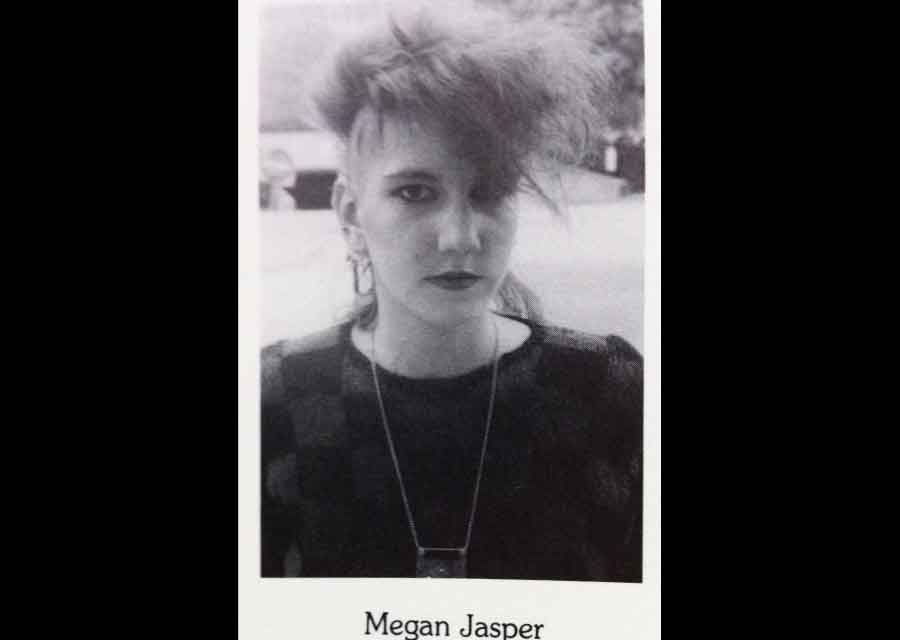
Did you get your start in music as a DJ at an NPR station at the age of 15 in Worcester?
I did. WICN.
What did radio mean to you then? Being able to present your ideas in a public forum like that.
Well it meant a few things. It meant that I was someplace that I loved around the things that I loved and not stuck at home. I was just like in this place… I just felt magical and that was maybe even best part about having a radio show was just, being in this space that was all music and not even thinking about the poor listeners who had to tolerate us. The fact that we were able to play music that was really meaningful to us and we felt it was music that was changing our lives at the time and looking back it absolutely was. To be able to share that with people. That's a pretty cool privilege.
It was a hardcore show, right?
Yeah, hardcore, punk, new wave. It was an overnight shift so it was very forgiving with genres.
So what was a setlist like?
There was a lot of like Discharge, UK Subs, GBH, Anti Nowhere League. So a lot of like British punk stuff and then a whole lot of stuff like Toxic Reasons, Circle Jerks, Boston Punk, SST control, Gang Green, the Proletariat. All sorts of shit that we loved. Then you know you need the Wipers you need, Mission of Burma, you need X and the Adolescents and all sorts of shit. It was so fucking fun. While the music was airing, we would just blast it in the studio and dance and scream and we had super thick Worcester accents. So then afterwards you'd have the song finish you'll be like "damn that was Discharge. Check out the guitar! Ah man that was cool." I think people used to listen to it, not because it was such a rad show but because we were such fuckin weird pip squeaks with fucked up accents that it was like it was probably unintentional comedy.
What was the name of the show?
I don't think we had a name, it was just the overnight shift.
Who did you do the show with?
With my friend Judy and my sister Maura.
How did it come, how did you guys find the show. How did this happen?
Judy's sister Joanne introduced us to a lot of great music and she had a shift and then she introduced us to the music director and programmer at the time Uncle Mark – Mark Lynch –who still lives in Worcester and is just contributes immensely to that city. I think he was humored by us and so he decided to give it a shot. So long as we were able to do it and we showed up every week on time and it was like the best moment of the week. We would never have been late for that.
You know, what the funny thing is, the record station was in this building on Grove Street in Worcester. Also in that same building was D.Y.S. – The Department of Youth Services – which D.Y.S was also a Boston hardcore band but we used to have to go to fucking D.Y.S., me and my sister, because we had a probation officer. I mean we didn't fuck up like in that kind of way but in Massachusetts there's the Wayward Child Act, where if you have kids that you think are up to no good or they're fucking up and getting in trouble, you can take them into the court system. So we were taken in because we were fucking weird looking, shit-bags who were busy doing our own thing all the time and we didn't look like anyone else. We looked like weird crusty punks in the 80s. So we would go there into the same building once a week to meet the probation officer and then we would go in on Friday nights for our radio show.
So what were the meetings like with the probation officer? You must've been a nice kid who just had a mohawk right?
Yeah I was super nice but I didn't want people to know I was nice. So I would sit with him and I tried to be as despondent as I could. I used to go in with my sister, that was the only saving grace was at least we could suffer through it together. So his name was Skip and he said, "Maura, I think you're good, I think we're done. I don't think you need to be here,” etc. And I'm like “Am I good too?” And then he told me he wanted me to keep showing up because I had been despondent. And I sat there for the rest of the session. I just flip them off and I wouldn't put my hand down even when it was tired. I was so pissed off I went for another year.
You really were punk rock!
Well, I just was shitty, pissy and there was nowhere else I needed to be. I mean, I clearly wasn't working that day.
Why do you think you were that way?
Well I think that it was at a time in my life when I didn't totally know... Actually, you know, it's not that I didn't know who I was because I had an understanding of who I was, but I just never felt like I fit in anywhere. I felt like a total fucking misfit my entire life. In school, I felt like a misfit. At home, I felt like a misfit. When I had to go to church, I felt like a total misfit. I felt like a misfit everywhere. I think I was just struggling to understand where my place was and it's hard to have those kinds of coping skills when you're that old, you know? So you show yourself and communicate in whatever way you know how and the only way I knew how it was with a mohawk and my middle finger.
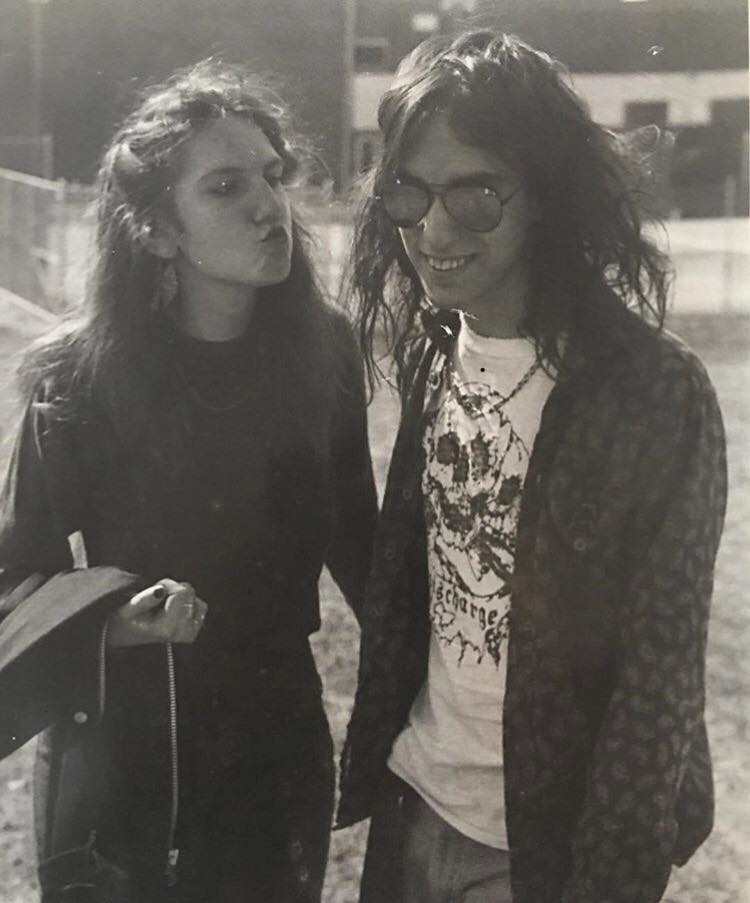
You're a walking middle finger. Was music a connector for you then?
Oh for sure. Being in a space filled with music, whether it was the radio station or whether it was an all ages show in Boston or Worcester or whether it was on the road with Dinosaur Jr. Those are the moments when I truly felt like myself and I had never experienced that before.
For those who don't know, what was your role with Dinosaur Jr.?
Well, early on in college, actually my first role was I think for two weeks. I was their manager. I was their second manager and I said to [J. Mascis] “So tell me what you need me to do,” and he said, “Just get us a show in Boston.” So I got them their first Boston show at The Rat and they played and got shut down because they were so loud.
They were loud.
They were loud. So my managerial days were done.
Wait hang on! So The Rat was ostensibly known as the punk rock place in Boston right? They were so fucking loud they got shut out of the punk rock place?!
Yeah. They were loud.
Why were they so loud?
Well I think… you know how Jay has a reputation for just being quiet? I think he's not quiet, but when he was quiet maybe he just expressed himself through his music. For as quiet as he was, his music was super loud. He had a lot to say. He just wasn't saying it with real words. He was saying it with music. And it was way cooler to be loud than soft. So I did that and then I would go on the road with them or go to shows with them and sell merch or change guitar strings, whatever they needed. Set up the drums break down the drums.
Were you a guitar player?
No, but that's what Jay needed. So I was like "I can change your guitar string" and he showed me how, so I did that.
Do you recall the sights the smells the sounds, the moment you first stepped into Sub Pop Records? What that was like and how you felt?
I'll even start before I went in there because it was my first day in Seattle and I remember there was a flyer on a post that was for a Love Battery show and I looked at it and, as goofy as it sounds, I knew that this was my destiny. I knew, I just knew it in my gut that this was something that was going to impact my life and I was supposed to follow it. So I went into the offices, Bruce [Pavitt] and Jon [Poneman] I'd met on n the Dinosaur tour earlier in the spring and they said "pop on by when you're in Seattle," so I popped by. They had just had this massive delivery of vinyl. And the offices were really fucking small, so it was just chaos inside. With like four or five people on the phone walking around giving orders to each other, it was like just complete chaos. And then Bruce said "Is it possible for you to just come back tomorrow?" Partially I was like "uh yes" because it was so weird that I wanted to leave, but it was also so exciting I didn't want to leave. So I split and had a great day in Seattle and I went back the next day and they said, "So we got all these Cat Butt records in, you want to just stuff them and send them off to radio stations?" And I said yes. I remember all of it. I remember Erica Hunter that I told you about, Erica Manhunter. That's how she would get people to call her back. She'd say “It's Erika from Sub Pop calling about Mudhoney. Yes. Erica Hunter. Erica Hunter, as in Manhunter.” She is still one of the funniest people I've ever known.
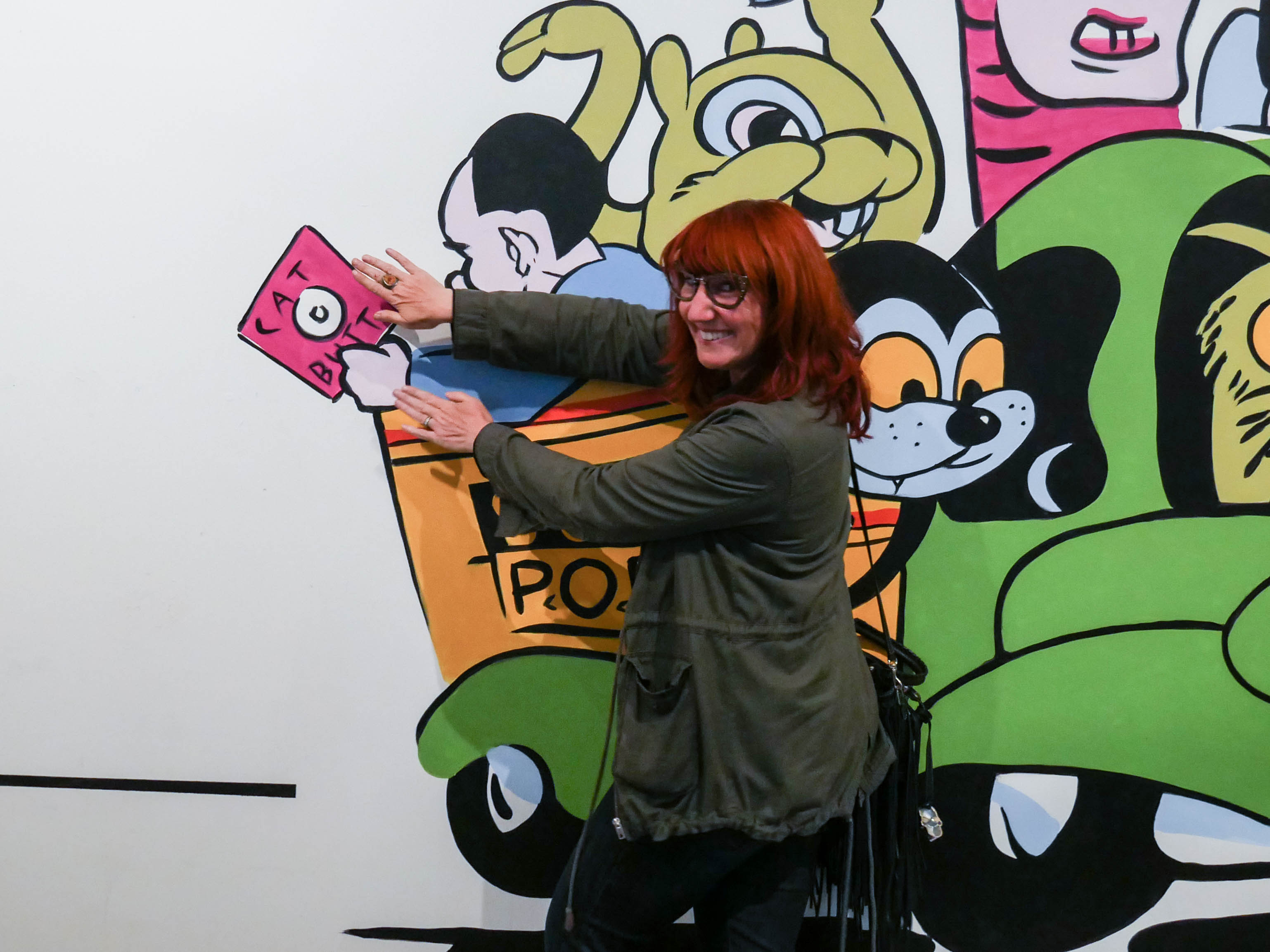
So you were let go from the label because of money woes. You didn't do anything wrong, it's just they ran out of cash.
They ran out of cash. I still say I was fired.
Why?
It sounds better!
I guess fired sounds better, especially from your position.
It sounds more punk.
So then you return to the label. What were the lessons that you brought with you from your time away?
When I was gone I worked for distribution companies and so I felt like I was able to bring something of value back because I understood the world of distribution and how it worked and what was valuable. I also knew what I needed to be armed with as a sales person in order to seal the deal. Because sales… that's the last step in the business. It's like you want to sell something. So you can market it and promote it and you need to set it up, have a story and build everything and you hope that all of that shit that translates to a sale. So I knew what I needed to walk in with in order to secure a sale. And I thought I need to make sure that all of that shit is there for every salesperson. So it was just a perspective that I maybe was able to carry back. I think also because I was close enough to Sub Pop and I was selling their stuff, I knew everyone who worked there, I knew the bands they were working with, I knew the records they were putting out but I was working for a different company out of my apartment. So I didn't have any of the scar tissue that a lot of folks at Sub Pop had developed at that time, meaning I have my own baggage, but I didn't have any of their baggage. That's kind of a fucked up way to put it maybe. I think the fact that I was just a little bit removed was good for me.
Describe your ears and how you know when you hear something is artistically important and musically meaningful. That sounds pretentious.
So I believe with any kind of art that you don't need to be an expert in it, it's just a matter of what resonates for you. Because honestly I don't know that I'm the person who can pick out a hit. I think that collectively at work we can sit around and talk about music. And if a lot of us like something or feel really strongly about something that probably means that other people in the world will have that same experience. So we can sort of use ourselves like guinea pigs and just listen to the music and see if it works for us because we're no different than anyone else who loves music. So for me, all I know is what speaks to me and you know I am a misfit in the world still. But I don't feel like I'm a misfit in the world of music and I feel like I am with my people when in this community. So if it resonates with me it may also resonate with somebody else.
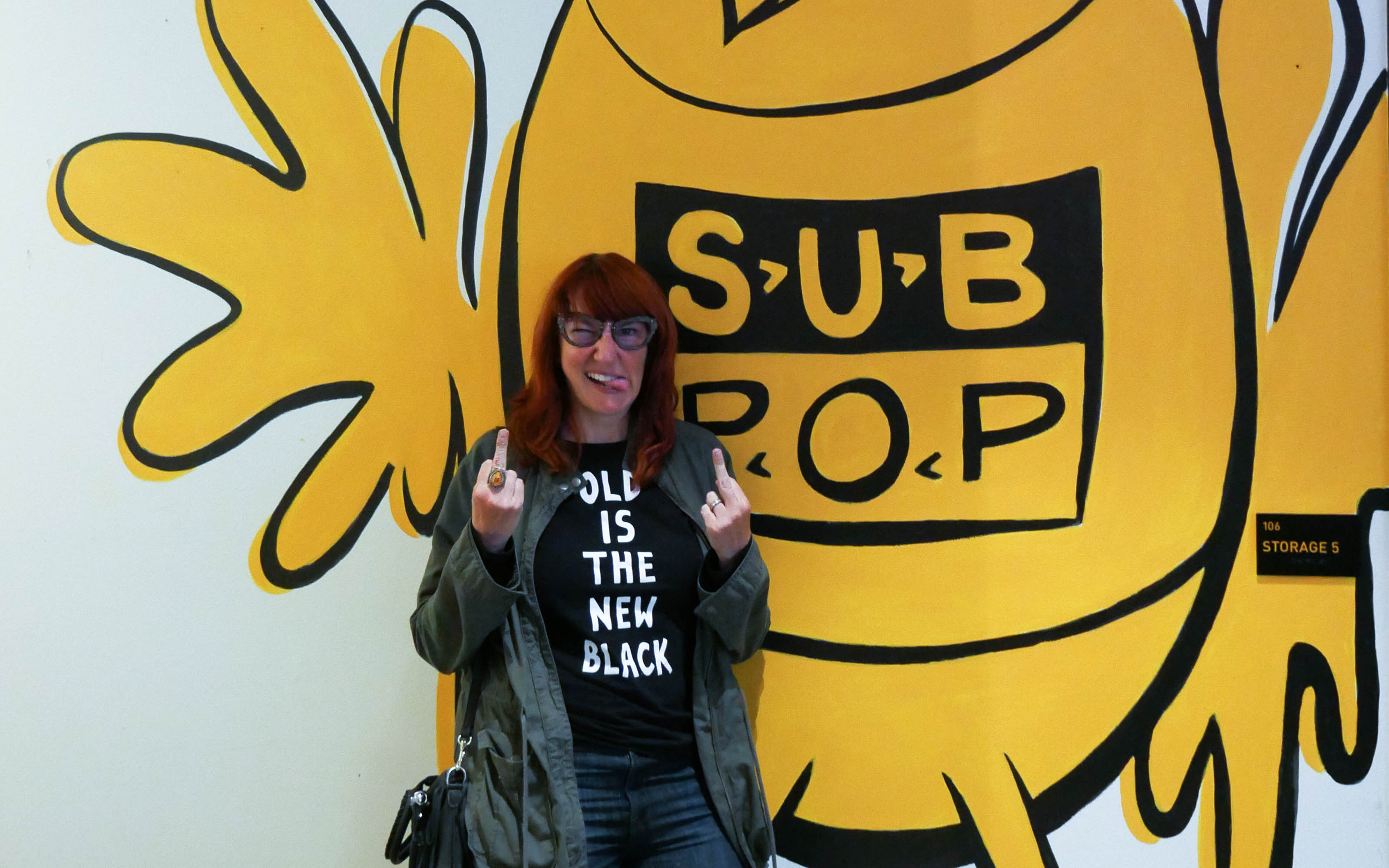
KEXP will be live streaming video from Sub Pop's SPF30 event all day tomorrow, Aug. 10, from Alki Beach. Find more details on the schedule, our Sub Pop count-up, and more here.
Three giants of Sub Pop look back at the label's incredible and still enduring run, from Green River to Fleet Foxes.
The New York indie rock outfit talks about their eight years as a band, being signed to Sub Pop, DIY culture, and each members' new projects.
The Sub Pop themed Boeing 737-800 will make regular trips up-and-down the west coast, starting today.